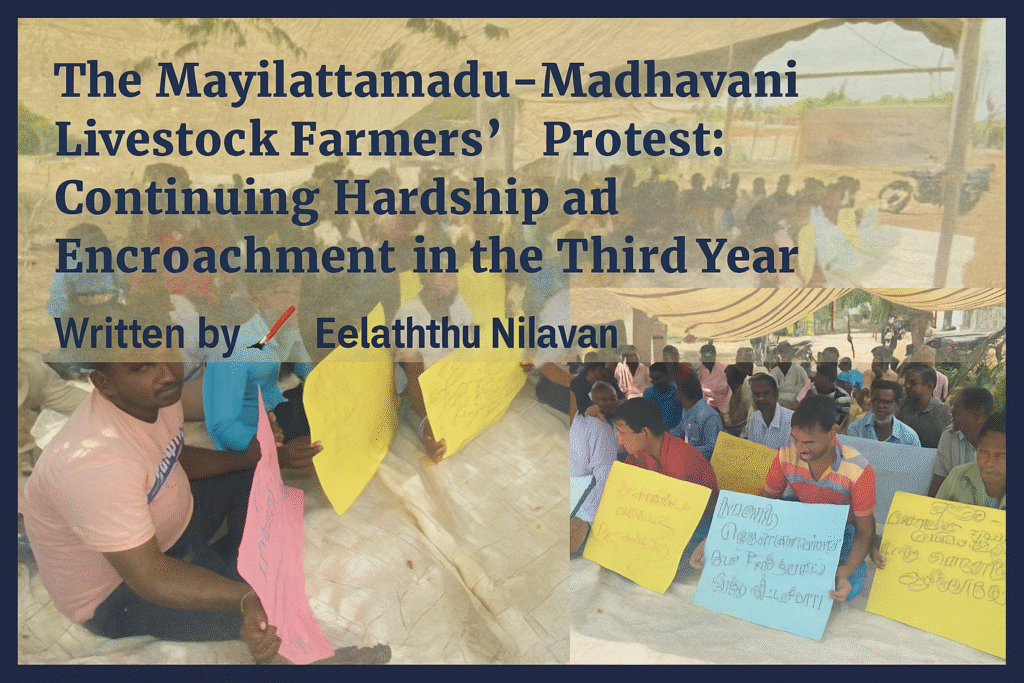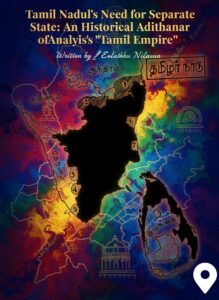✧. Introduction: 730 Days Without Resolution
The traditional livestock farmers of Mayilattamadu and Madhavani have been conducting a moral and livelihood-based protest for their grazing land rights for over 730 days. On 15 September 2025, the protest reached this milestone at the Sithandi protest site, yet no official resolution has been achieved.
This protest is more than a livelihood issue; it raises critical questions about land rights, environmental balance, the preservation of traditional livestock breeds and pastures, social identity, and the future stability of the region.

✦. Aftermath of the Megadevelopment (Destructive Development) Project
➊. Administrative and Political Manipulation (Planned Encroachment)
● Role and Objectives of the Megadevelopment Authority:
Bringing traditional grazing lands under the guise of “development” has long-term goals that are not always visible.
○ Demographic Shift: Planned Sinhalese settlements aim to change the ethnic composition of the district.
○ Reduction of Political Representation: By altering demographics, the political influence of the Tamil community is weakened.
○ Removal of Local Administrative Authority: Lands under the megadevelopment authority are removed from traditional district and provincial administrative control, transferring power to central governance.
● Helplessness of Local Officials:
Despite being aware of long-term risks and injustices, local officials often cannot intervene due to political pressure.
➋. Environmental and Cultural Destruction
● Violation of Land Rights and Threat to Livelihoods:
Land encroachment violates farmers’ legal rights and endangers the survival of traditional livestock breeds and other species.
● Extinction Risk for Indigenous Livestock:
Destruction of grazing lands deprives local livestock of essential food, threatening their survival. This is not merely a loss of livestock—it is the erosion of a cultural heritage.
● Ecological Degradation:
Artificial pastures and commercial interventions displace naturally growing grasslands, disrupting essential environmental cycles and agricultural balance.
● Protein and Food Shortages:
Destruction of traditional pastures increases demand for meat without sustainable local sources, leading to protein scarcity and nutritional stress.
➌. Undermining the Protest’s Momentum
● Diverting the Core Challenge:
Forces with vested interests are diluting the protest’s impact, reducing its visibility, and undermining genuine civil society participation.
● Government Intermediaries:
Certain individuals, claiming to represent civil society, act as intermediaries for government interests, misrepresent protestors’ demands, and facilitate policies that compromise farmers’ rights.
✦. Necessary Solutions to Avoid Historical Mistakes
● Immediate Halt to Encroachment:
Stop any development or destruction of traditional grazing lands. Protect livestock habitats, which are intricately connected to the natural ecosystem.
● Permanent Grazing Land Designation:
Officially declare traditional pastures as permanent grazing lands (Gazetted) and remove them from the megadevelopment authority’s jurisdiction.
● Accountability:
Identify and hold responsible district officials, politicians, and individuals attempting to misdirect or manipulate the protest for personal or political gain.
● Community Unity:
Ensure farmers are protected from exploitative interests, and continue the protest with the support of genuine civil society to achieve its original objectives.
“The resources and heritage we leave behind will serve as a foundation for future generations.”
✦. Conclusion:
The Mayilattamadu–Madhavani protest demonstrates the unwavering resolve of a community to protect its livelihood and heritage. Attempts to divert the protest and the covert actions of governmental machinery have elevated this issue to the level of a deliberate political conspiracy.
Preventing this historical mistake requires coordinated action by farmers, genuine civil society, and informed citizens. Failing this, future generations will hold us accountable for decisions that undermine livelihoods, destroy heritage, and destabilize the environment.

Written by: Eelaththu Nilavan
Tamil National Historian | World Politics, Economics & Military Analyst



